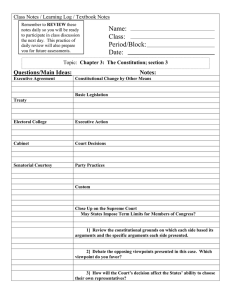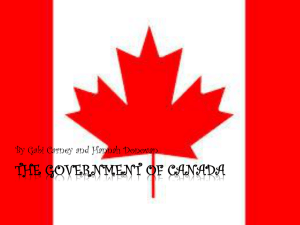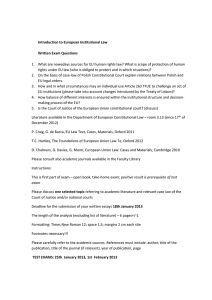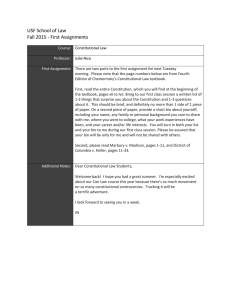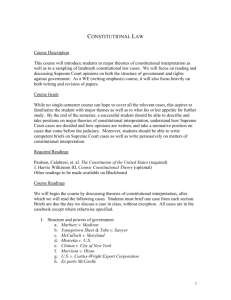A C L (
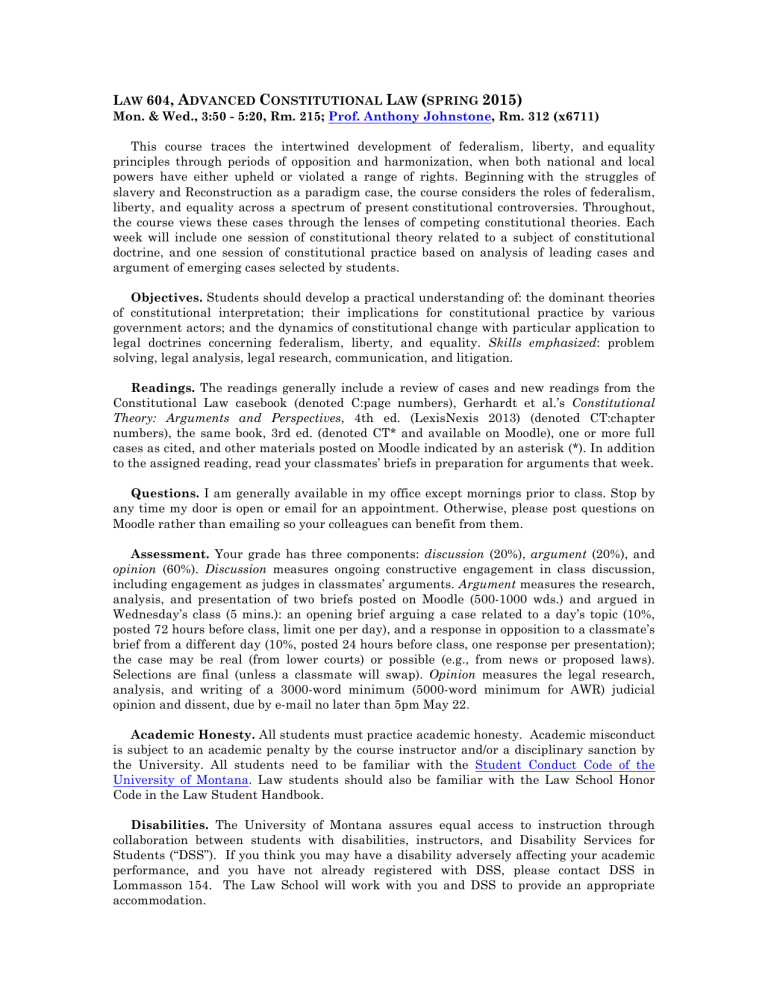
L AW 604, A
DVANCED
C
ONSTITUTIONAL
L
AW
(
SPRING
2015)
Mon. & Wed., 3:50 - 5:20, Rm. 215; Prof. Anthony Johnstone , Rm. 312 (x6711)
This course traces the intertwined development of federalism, liberty, and equality principles through periods of opposition and harmonization, when both national and local powers have either upheld or violated a range of rights. Beginning with the struggles of slavery and Reconstruction as a paradigm case, the course considers the roles of federalism, liberty, and equality across a spectrum of present constitutional controversies. Throughout, the course views these cases through the lenses of competing constitutional theories. Each week will include one session of constitutional theory related to a subject of constitutional doctrine, and one session of constitutional practice based on analysis of leading cases and argument of emerging cases selected by students.
Objectives.
Students should develop a practical understanding of: the dominant theories of constitutional interpretation; their implications for constitutional practice by various government actors; and the dynamics of constitutional change with particular application to legal doctrines concerning federalism, liberty, and equality. Skills emphasized : problem solving, legal analysis, legal research, communication, and litigation.
Readings. The readings generally include a review of cases and new readings from the
Constitutional Law casebook (denoted C:page numbers), Gerhardt et al.’s Constitutional
Theory: Arguments and Perspectives , 4th ed. (LexisNexis 2013) (denoted CT:chapter numbers), the same book, 3rd ed. (denoted CT* and available on Moodle), one or more full cases as cited, and other materials posted on Moodle indicated by an asterisk (*). In addition to the assigned reading, read your classmates’ briefs in preparation for arguments that week.
Questions. I am generally available in my office except mornings prior to class. Stop by any time my door is open or email for an appointment. Otherwise, please post questions on
Moodle rather than emailing so your colleagues can benefit from them.
Assessment.
Your grade has three components: discussion (20%), argument (20%), and opinion (60%). Discussion measures ongoing constructive engagement in class discussion, including engagement as judges in classmates’ arguments. Argument measures the research, analysis, and presentation of two briefs posted on Moodle (500-1000 wds.) and argued in
Wednesday’s class (5 mins.): an opening brief arguing a case related to a day’s topic (10%, posted 72 hours before class, limit one per day), and a response in opposition to a classmate’s brief from a different day (10%, posted 24 hours before class, one response per presentation); the case may be real (from lower courts) or possible (e.g., from news or proposed laws).
Selections are final (unless a classmate will swap). Opinion measures the legal research, analysis, and writing of a 3000-word minimum (5000-word minimum for AWR) judicial opinion and dissent, due by e-mail no later than 5pm May 22.
Academic Honesty. All students must practice academic honesty. Academic misconduct is subject to an academic penalty by the course instructor and/or a disciplinary sanction by the University. All students need to be familiar with the Student Conduct Code of the
University of Montana . Law students should also be familiar with the Law School Honor
Code in the Law Student Handbook.
Disabilities. The University of Montana assures equal access to instruction through collaboration between students with disabilities, instructors, and Disability Services for
Students (“DSS”). If you think you may have a disability adversely affecting your academic performance, and you have not already registered with DSS, please contact DSS in
Lommasson 154. The Law School will work with you and DSS to provide an appropriate accommodation.
Spring 2015 ADVANCED CONSTITUTIONAL LAW
1.
1/26
1/28
The syllabus is subject to change depending on course and legal developments.
A. WHY THEORY?
(40)
CT:1 (American Constitutional Theory); CT*:15 (Theory and Discontents)
B. Slavery and Segregation (27)
2.
2/2
2/4
*Prigg v. Pennsylvania (1842); *Lemmon v. People (NY 1860)
A. CONSTITUTIONAL CHANGE
NFIB v. Sebelius
(42)
CT:2 (Constitutionalism and Constitutional Change)
B. The Health Care Cases (101)
, 567 U.S. 1 (2012)
3.
2/9
2/11
A. JUDICIAL RESTRAINT (23)
CT:3 (Judicial Activism and Restraint)
4.
2/16
B. Takings (54)
Kelo v. City of New London , 545 U.S. 469 (2005)
A. JUDICIAL REVIEW (46)
CT:4.01-4.02 (Theories of Judicial Review)
2/18 B. Law of Democracy (96)
Citizens United v. Federal Election Comm’n , 558 U.S. 310 (2010)
5.
2/23
2/25
A. JUDICIAL SUPREMACY & CRITICS (46)
CT:4.03-4.04 (Judicial Supremacy Critiqued and Debated)
B. Civil Rights Enforcement (34)
Shelby County v. Holder , 133 S. Ct. 2612 (2013)
6.
3/2
A. ORIGINALISM (78)
CT:5.01-5.05 (Originalism)
3/4 B. Right to Bear Arms (83)
District of Columbia v. Heller , 554 U.S. 570 (2008)
7.
3/9
A. ORIGINALISM’S CRITICS (52)
CT:5.06-5.08 (Critiques) & CT:10 (Progressive Originalism)
3/11 B. Federalism (78)
Printz v. United States , 521 U.S. 898 (1997)
8.
3/16
A. STRUCTURAL REASONING (47)
CT:6 (Structural Reasoning); CT:11.01-.03 (Separation of Powers)
3/18 B. Separation of Powers (62)
NLRB v. Noel Canning , 134 S. Ct. 2550 (2014)
2
Spring 2015 ADVANCED CONSTITUTIONAL LAW
9.
3/23
A. MORAL REASONING (24)
CT:7 (Moral Reasoning)
3/25 B. Liberty Interests (88)
Washington v. Glucksberg , 521 U.S. 702 (1997)
10.
4/6
4/8
A. PRECEDENT (22)
CT:8 (Precedent in Constitutional Adjudication)
B. Abortion (43)
Gonzales v. Carhart , 550 U.S. 124 (2007)
11.
4/13
4/15
A. NATURAL LAW, LIBERTARIANISM & ITS CRITICS (50)
CT:9 (Conservative and Libertarian Theories)
B. Economic Liberty (37)
Lee Optical v. Williamson , 120 F.Supp. 128 (1954); Williamson v. Lee
Optical , 348 U.S. 483 (1955); Milnot Co. v. Richardson , 350 F.Supp. 221
(S.D. Ill. 1972); Hettinga v. U.S
, 677 F.3d 471 (D.C. Cir. 2012)
A. CRITICAL LEGAL THEORY (65) 12.
4/20
4/22
CT* 12 & 13 (Selections) (Feminist and Critical Race Theory)
B. Affirmative Action (54)
13.
4/27
Schuette v. Coalition to Defend Affirmative Action , 134 S. Ct. 1623 (2014)
A. THEORY & PRACTICE IN THE MARRIAGE CASES
Tentative: Deboer v. Snyder
Readings TBD
(6th Cir. Nov. 6, 2014);
Tentative: Baskin v. Bogan , 755 F.3d 648 (7th Cir. 2014)
4/29 B. Same-Sex Marriage
(86)
3

